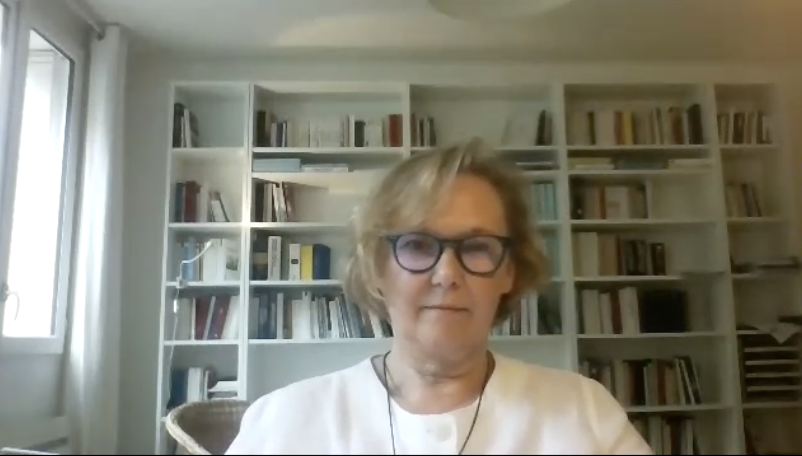
Anne-Cathy Graber is a Mennonite itinerant pastor. A protestant theologian, she teaches in the Jesuit Faculties in Paris as co-director of the Chair of Ecumenical Theology. She is on the international committee for the Global Christian Forum and also serves on the Faith and Order Commission of the World Council of Churches. Anne-Cathy has been living in a Catholic community, the Chemin Neuf, for thirty-seven years, and is a consecrated sister (so has the unique calling as both a pastor and a religious sister!).
Anne Cathy recently sat down with GCF secretary Rev. Dr. Casely Essamuah to talk about a recent award she received for her scholarship on ecumenism, as well as COVID-19 life, and heart heart for the Christian church.
You can watch this conversation at https://youtu.be/gAzrO1xv2ko
The Harding Meyer Prize
The Harding Meyer award for ecumenism is an award to encourage the involvement and theological work in ecumenism.
Harding Meyer was a leading figure in the ecumenical movement in the past fifty years. He had a decisive influence on the international Lutheran-Catholic dialogue. Many methodological approaches of contemporary ecumenism can be traced back to him, such as reconciled diversity, differentiating consensus, and so on. These principles, Meyer argued, enable the various Christian families to move forward in seeking reconciliation and church unity without sacrificing their own distinctive identities.
The expression of Harding Meyer “unity through reconciled diversity” is very important. It’s not only about pursuing unity through pursuing diversity along—that’s already very good! But maybe it is a bit too easy. Indeed there is a risk to the church pursuing unity only by pursuing diversity, and then adding to our differences. In this case, there is no transformation!
“Unity through the reconciled diversity” goes further. It calls for work on our differences so that they won’t be an occasion of separation; that is to share our differences, our diversities, but also to expose them to the work of reconciliation and transformation. It’s what Harding Meyer did in an amazing way.
This theologian is also one of the promoters of the differentiated consensus, or differentiating consensus. This methodology, among others, enabled the signature of The Joint Declaration on the Doctrine of Justification. This joint declaration has presently been signed by five Churches or Communions of Churches. The award aims to continue the legacy of Meyer’s innovative work, especially regarding these two key ecumenical principles.
The award was for my PhD work, Mary: A Study Comparing John Paul II’s Redemptoris Mater and Luther’s Commentary on the Magnificat in Light of the Ecumenical Dialogues.
Maybe it seems a bit unusual for a Mennonite to choose a subject about Mary. In fact, in my tradition, we don’t speak a lot about her, and Mary isn’t an usual subject in dogmatic theology! But I’ve discovered that this subject isn’t a peripheral subject in theology. Marian theology focuses on all the theological challenges, especially the complex question of human mediation, and participation to the mission of Christ.
Dr. Graber’s Pilgrimage of Faith
Three verses of the Bible were fundamental in my life in my pilgrimage of faith. When I was a child (I was 7 years old), it was the verse where Samuel says: “Speak oh Lord! Your servant is listening!” The incredible good news for me was that God is interested in children.
Today, this word is real for the ecumenical dialogue: to listen to the voice of another person, to learn how to understand his language.
The second verse is the prophecy of Simeon when he gives Jesus back to Mary: “He will be a sign of contradiction” (Luke 2:34). To welcome Christ as a “sign of contradiction” is difficult. It means that Christ is also the One who contradicts my logic, my way of seeing and doing. But this contradiction is necessary because it avoids closure, and allows us to cross the borders that are too closed!
The third verse, which was a foundation, is the commandment to love “You will love the Lord your God with all your heart, all your soul, all your strength, and all your thought… and your neighbor as yourself” (Matthew 22.37).
These last words, when heard today in an ecumenical context, have taken a wider sense for me: to love my neighbor as myself also means that I am called to love the church of the other as mine, as my body. It is an invitation to do for the church of the other as I would like it to be done for mine.
Lessons for the Church During COVID-19
I think it is important not to give an answer to what we’re learning from COVID-19 too quickly. Indeed, the churches may be tempted a bit too quickly to declare what they “know”!
I think the answer is about vulnerability and fragility. We all have touched our vulnerability and our fragility. One of the answers the churches could give is this: we don’t have to be afraid of vulnerability and fragility. Churches have to stand close to vulnerability and fragility, not to run away from them. They can be a “safe space” to welcome this vulnerability and fragility. The answers will come later. We must first welcome this vulnerability unconditionally and then take care of it.